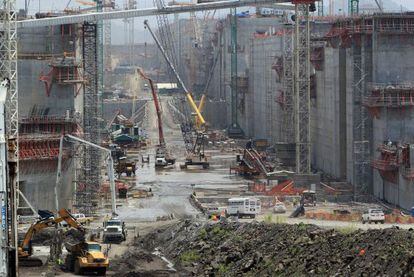Agreement reached for completion of Panama Canal by end of 2015
International consortium led by Spain’s Sacyr had halted work after dispute over cost overruns

After months of negotiations, the Panama Canal Authority (PAC) and the multinational construction consortium, Grupo Unidos por el Canal (GUPC) – made up of Spain’s Sacyr Vallehermoso, Italy’s Impreglio, Belgium’s Jan de Nul, and Panamanian company Constructora Urbana de Panamá – have agreed a completion date for expansion of the route connecting the Atlantic and the Pacific for December 2015.
The PAC told EL PAÍS that it had signed an agreement with the GUPC “that formalizes the agreements reached last March to complete work.” This followed a deal in late February over $1.6 billion in cost overruns that had stopped work for several months and threatened to delay the project for years. Under the terms of the deal, both parties have committed to complete the construction and inject an additional $100 million each to cover additional costs.
Both parties have committed to complete the construction and inject an additional $100 million to cover costs
"What remains now is to continue working with the commitment to complete the expansion, which is currently at 78-percent progress," ACP administrator Jorge Quijano said on August 1. Following the memorandum of understanding in March, PAC and the consortium had set a June 30 date to find a solution to their differences.
According to Spanish state news agency EFE, sources at GUPC said that “the way is completely clear for the completion of the job.”
The dispute about cost overruns stopped work at the beginning of the year. Both sides are locked in an unprecedented legal battle that began in January when the consortium asked PAC to cover cost overruns dating back to 2009 when work began.
The original completion date for the $5.3-billion expansion project was October 2014. This is now the eighth year of a project to add a third set of locks to the 80-kilometer-long complex of canals and lakes. The expansion is needed to accommodate newer, larger ships that are currently too large to fit in the canal. The current locks can fit vessels that carry about 5,000 TEUs and the expansion would allow the canal to accommodate ships of up to 13,000 TEUs. (A TEU, or twenty-foot equivalent unit, is a unit of measurement to describe a container and how many a vessel can carry.)
The expansion is needed to accommodate newer, larger ships that are currently too large to fit in the canal
On July 21, an international arbitration court in Miami began hearing both sides’ versions of events over the dispute. GUPC is asking for an initial tranche of $180 million to cover ongoing costs, a figure that will likely rise to $1.6 billion.
The press statement about last week’s agreement, details of which have not been released, “does not foresee payment for cost overruns or demands, and that these should be managed in accordance with the mechanisms established in the contract,” said PAC, referring to external arbitrage.
GUPC says it ran into geological conditions at the site, and blamed Panama for failing to undertake a full survey
GUPC won the contract in 2009 with a $3.2 billion bid, with the Panamanian government agreement to provide the remaining $2 billion. GUPC says it needs more money to finish the project because, among other things, it ran into unanticipated geological conditions at the work site, and blamed the Panamanian authorities for failing to undertake a full survey of the area.
In December 2010, EL PAÍS reported that documents released by the WikiLeaks whistle-blower website showed that the US State Department had warned the Panamanian authorities that Sacyr would not be able to finance the work.










































